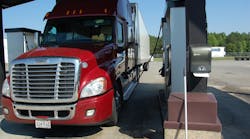New analysis released by Fitch Ratings concludes that increasing federal fuel taxes alone won’t be enough to solve U.S. transportation infrastructure funding needs and that other mechanisms will be needed – principally more roadway tolling, the company said.
In particular, Fitch said the recent Congressional proposal to increase fuel taxes by 12 cents per gallon or some 66% would only stabilize the highway trust fund (HTF) for the short term.
“Our analysis indicates that, if the federal gas tax had been indexed to inflation when it was last raised in 1993, HTF receipts could have kept pace with HTF outlays,” the company said. “We estimate the current rate would be approximately 30 cents per gallon, comparable to what Senators [Chris] Murphy [D-CT] and [Bob] Corker [R-TN] are proposing, versus the current 18.4 cents per gallon.”
Another even shorter-term funding proposal being floated by Finance Committee Chairman Senator Ron Wyman (D-OR), which will be considered by the financce committee tomorrow, would raise an estimated $9 billion $10 billion through a variety of tax “tweaks” to keep the HTF solvent for six months. However, the Congressional scoring of the bill notes that one key piece of its funding mechanisms comes from boosting fees on trucks weighing more than 97,000 pounds from $550 to $1,100 starting in June 2015; a change estimated to raise $1.3 billion over the next 10 years.
Yet to keep up with actual transportation infrastructure needs in the U.S. as estimated by the Congressional Budget Office (CBO), Fitch projects the federal fuel tax would need to rise to between 75 cents to 80 cents per gallon, which appears both politically and economically untenable.
“Even if the gas tax is raised, increasing corporate average fuel economy (CAFE) regulations will reduce the [fuel tax] benefits over the longer term,” according to the firm. “Those regulations will lower gas consumption by raising the fuel efficiency of all new cars to an average of 54.5 miles per gallon (MPG) by 2025. We estimate these requirements would result in a 13% reduction in receipts from today's levels by 2032. This illustrates the need for other sustainable long-term sources of revenue to address the country's growing transportation funding requirements.”
In Fitch's view, if strategically implemented, tolling can help better link costs for parts of the roadway network to the ultimate users and better manage highway capacity. “Implementing the greater use of tolling requires management of user fee levels to ensure affordability to the general population and promote economic activity,” the firm noted.
Yet pushback against tolling as a way to beef up highway funds is increasing. The Alliance for Toll-Free Interstates (ATFI) for one – which counts the American Trucking Associations (ATA) and various trucking companies as members – believes tolling is an “inefficient” and overly costly way to raise transportation infrastructure funding.
“According to the Transportation Research Board, the administrative, collection and enforcement costs of a typical toll facility are 33.5% of the revenue generated, compared to TRB’s finding that the administrative cost of the fuel tax is about 1% of revenue,” the group noted.
“Even though electronic toll collection can make tolling more efficient, it creates a series of new problems and is still relatively costly,” ATFI stressed. “For example, in 2003, researchers in New Jersey calculated the annual cost of electronic toll collection on the Garden State Parkway to be $46.9 million—or about 92% of what it cost the federal government to collect federal gasoline taxes in all 50 states during that year.”



